SAP SCM Review 2025
SAP SCM Supply Chain Plans & Pricing
SAP SCM Comparison
Expert Review
Pros
Cons
SAP SCM Supply Chain's Offerings
SAP supply chain management offers flexible pricing plans to cater to businesses of all sizes. The exact SAP pricing depends on various factors, such as the specific modules chosen, the number of users, and the level of customization required. To get an accurate quote, you need to contact SAP directly. It’s important to keep in mind that SAP’s solutions often provide a significant return on investment by streamlining operations, reducing costs, and improving overall supply chain efficiency.
Customer Support
SAP SCM platform offers a variety of customer support options including phone, live chat, and a contact form. On top of that, they have a blog, FAQ, and a learning HUB that includes classes and certifications to help customers get the most use out of their supply chain management software.

Personal Experience of Customer Support
I reached out to a support representative via chat, and they responded immediately, asking a few additional questions to see how they could best assist me. It was quick and responsive, and they made sure to help with any questions I had.
The one downside with chat was that it didn’t always work for me. That could’ve been caused either by a connectivity issue or a bug on their side. Other than that, I had a pleasant experience.
Features & Functionality
Training Options
Given the wide-ranging functionality of the software and its features, some users may encounter a learning curve when integrating it into their business processes. To facilitate a seamless transition, SAP provides several training options.
Core Features
SAP supply chain management software has a powerful suite of applications designed to optimize and streamline the entire supply chain process, from procurement to delivery. By leveraging advanced technologies and industry best practices, SAP SCM empowers businesses to enhance efficiency, reduce costs, and improve customer satisfaction. In the following section, I will delve into the key features and functionalities that make SAP SCM a leading solution in the market.
- Inventory management
- Order management
- Demand forecasting
- Supplier management
- Logistics and transportation management
- Warehouse management
- Procurement
- Analytics and Reporting
- Integration with ERP/CRM systems
- Compliance and risk management
- Return management (Reverse logistics)
- Collaboration tools
- Production planning
- Sustainability tracking
- Security and access control
Inventory Management
With this feature, you can track stored products and optimize stock locations with inventory management tools, allowing you to keep track of inventory and retrieve goods quickly and accurately for quicker shipment.
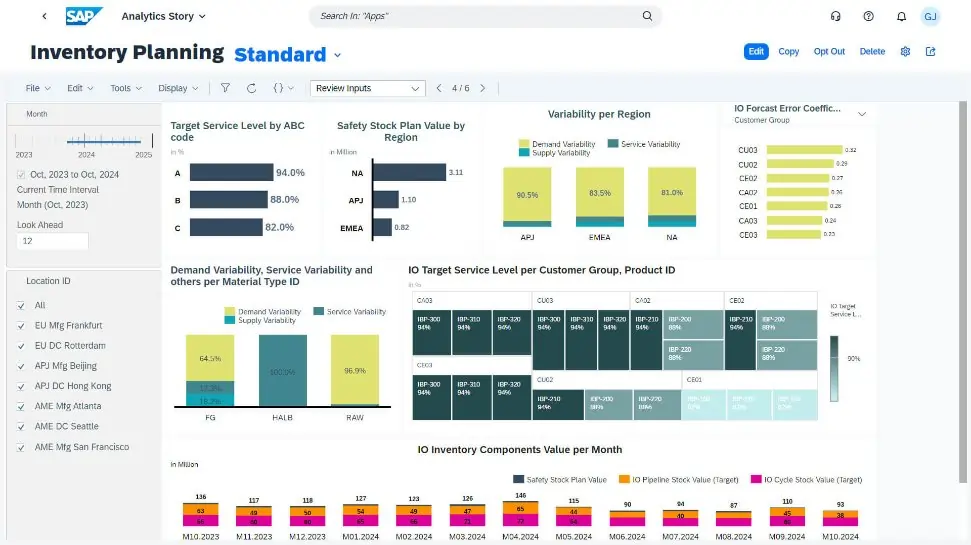
Order Management
SAP order management streamlines the entire order-to-cash process, from order creation to delivery and invoicing. Key features include order capturing, pricing, inventory checks, and availability confirmations. By integrating seamlessly with other SAP modules, SAP provides cross-functional visibility and collaboration.
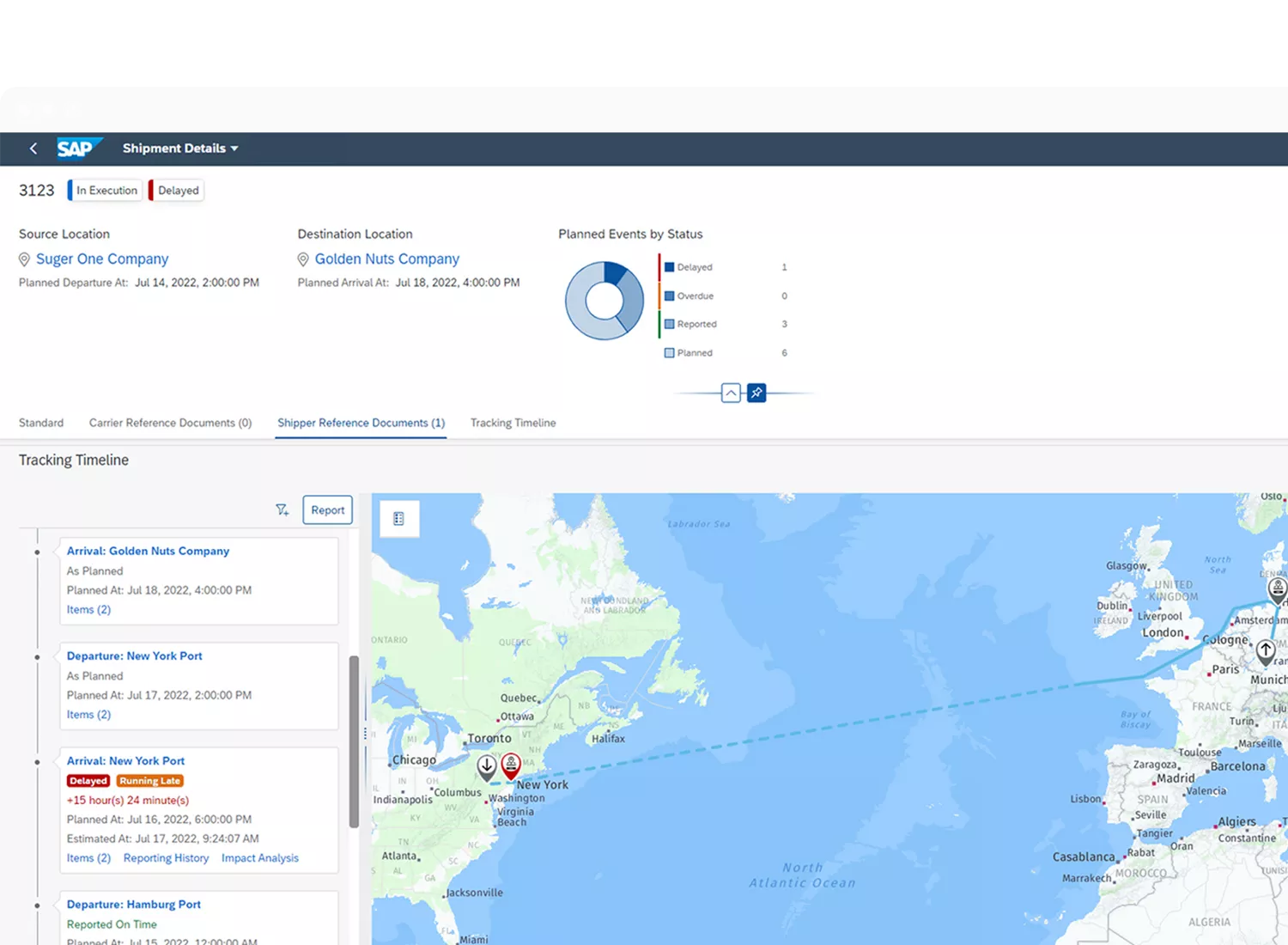
Demand Forecasting
SAP uses AI and analytics to let clients forecast product demand accurately. This helps improve planning practices to avoid overstocking and understocking of inventory.
Supplier Management
Supplier management is a critical component of the SAP SCM software. SAP offers a comprehensive suite of tools to establish relationships, maintain them, and collaborate with supply chain management vendors to ensure there’s a smooth running supply chain.
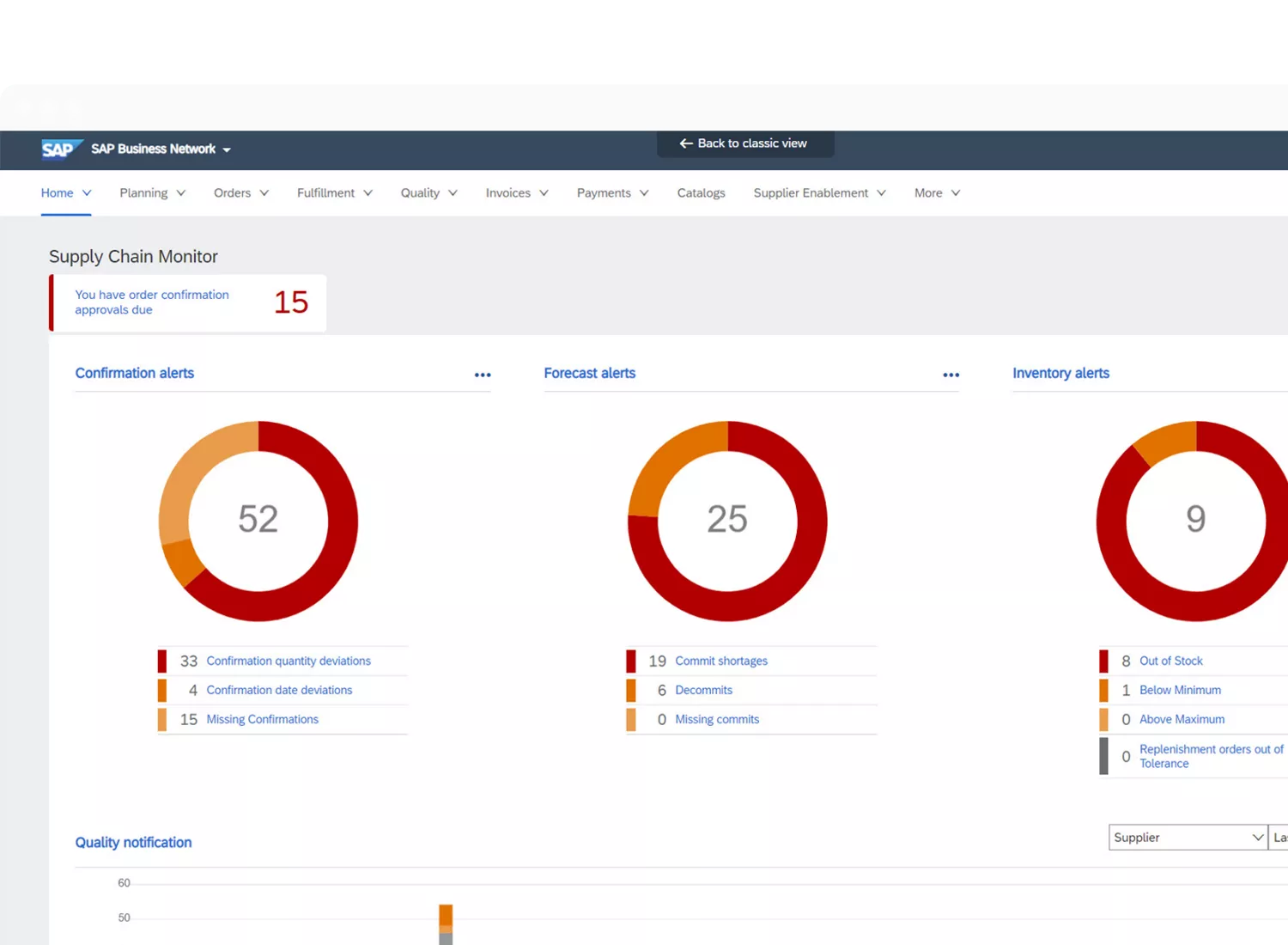
Logistics and Transportation Management
With SAP, you can take advantage of several transportation management modules to streamline the shipping process and manage delivery timelines effectively. SAP has additional scheduling tools to help schedule deliveries and drivers to keep shipments running on time.
Warehouse Management
SAP Extended Warehouse Management (EWM) is a software program that helps businesses manage their warehouses. It can be used to track inventory levels, optimize picking and packing processes, and automate warehouse tasks. SAP EWM can help businesses reduce costs, improve efficiency, and meet customer demand.
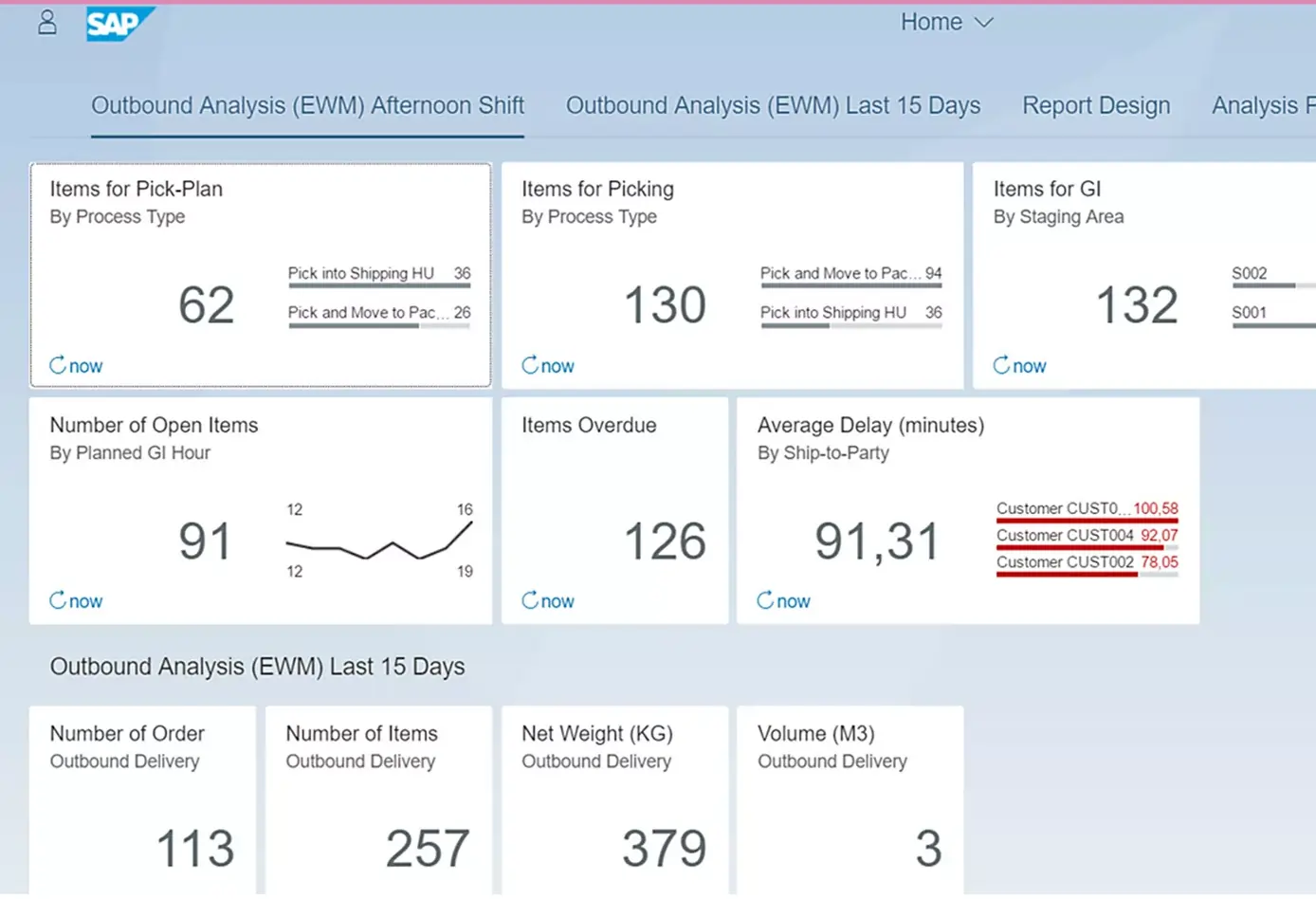
Procurement
SAP’s procurement solutions optimize supplier relationships, reduce costs, and ensure timely deliveries. Key features include supplier management, contract management, purchase order processing, and invoice management, enhancing supply chain efficiency and competitiveness.
Analytics and Reporting
With advanced analytics and machine learning capabilities, SAP enables businesses to generate accurate demand forecasts, optimize production schedules, and make informed inventory management decisions. Additionally, real-time dashboards, advanced analytics, customizable reports, drill-down analysis, and benchmarking tools provide valuable insights into supply chain performance, empowering businesses to make data-driven decisions and optimize operations.
Integration with ERP/CRM Systems
SAP SCM integrates with other SAP modules and third-party business applications.
Compliance and Risk Management
SAP SCM helps businesses maintain compliance with industry regulations and internal policies. Doing so, helps your business protect its brand reputation, minimize legal liabilities, and maintain a sustainable supply chain.
Return Management (Reverse Logistics)
SAP’s Advanced Returns Management solution optimizes reverse logistics processes and streamlines return processing. It tracks returns in real time and automates document generation to reduce costs and improve customer satisfaction.
Collaboration Tools
The SAP SCM platform fosters collaboration among various stakeholders, including suppliers, manufacturers, distributors, and retailers. By facilitating seamless communication and data sharing, SAP supply chain management software helps to streamline processes, reduce lead times, and improve customer satisfaction.
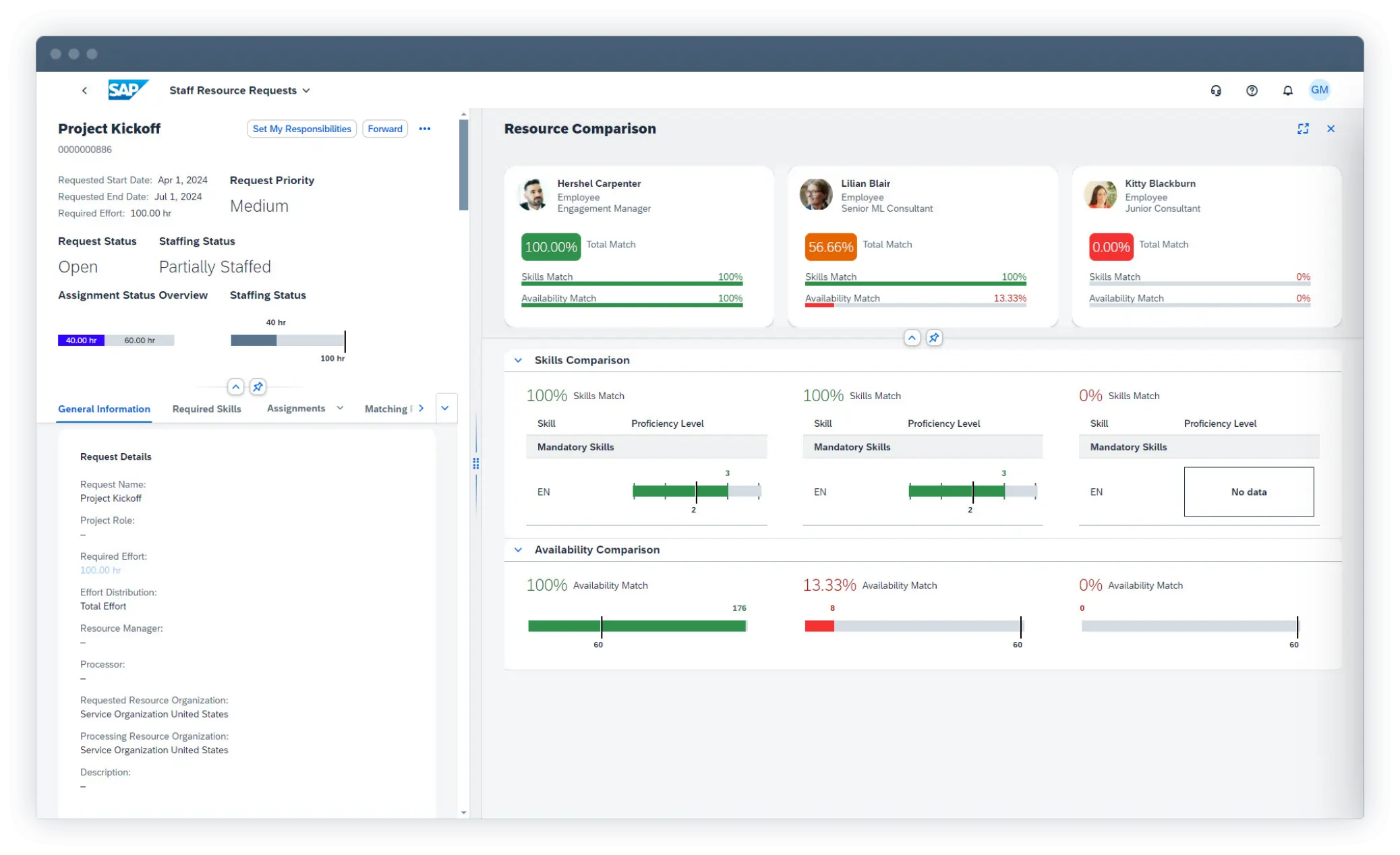
Production Planning
SAP provides supply chain management tools to help businesses optimize their product portfolios, improve demand forecasting, streamline production processes, and ensure efficient product lifecycle management. By leveraging SAP’s solutions, businesses can achieve greater agility, efficiency, and profitability in their supply chain operations.
Sustainability Tracking
Helps businesses build sustainable and resilient supply chains. By leveraging SAP’s powerful tools, you can reduce environmental impact, enhance supply chain transparency, promote social responsibility, and meet regulatory compliance. With SAP Sustainability Tracking, you can make informed decisions, improve operational efficiency, and contribute to a more sustainable future.
Security and Access Control
SAP prioritizes security and access control to safeguard sensitive data. Security features, like role-based access control, encryption, and regular security audits, ensure data privacy and integrity. By implementing stringent security measures, SAP SCM helps businesses protect their valuable information and mitigate potential risks.
Operating Systems
The platform’s capabilities perform on the following operating systems:
Performance:
SAP SCM is a powerful tool that streamlines the entire supply chain management. It offers real-time data processing, allowing you to make informed decisions quickly and seamlessly integrate with other SAP modules and third-party applications to ensure your operation runs smoothly and effortlessly.
SAP excels in demand forecasting, order management, supplier management, logistics optimization, and analytics. With reliable support and regular updates, SAP SCM empowers businesses to streamline operations, reduce costs, and improve overall supply chain performance.
Ease Of Use:
SAP SCM was designed with user-friendliness in mind. Its intuitive interface and customizable dashboards make it easy for users of all levels to navigate and understand.
The software’s clear layout and logical workflow minimize the learning curve, allowing users to become proficient in SAP quickly. Additionally, SAP offers comprehensive training resources and support to help users maximize the potential of the software.
With regular updates and enhancements, SAP SCM continues to improve its user experience, ensuring that it remains a reliable and efficient supply chain management tool for businesses of all sizes.
Verdict:
SAP SCM is an ideal solution for medium to large businesses looking to optimize their supply chain operations. While the initial pricing and ongoing maintenance costs can be significant, the long-term benefits in terms of increased efficiency, reduced costs, and improved customer satisfaction often outweigh the upfront expenses.
SAP SCM’s comprehensive feature set, including demand planning, inventory management, transportation management, and procurement, provides businesses with the tools they need to achieve supply chain excellence.
However, the complexity of the software and the steep learning curve may pose challenges for smaller businesses or those without experienced IT teams. It’s important to carefully evaluate your specific needs and resources before considering SAP SCM.
